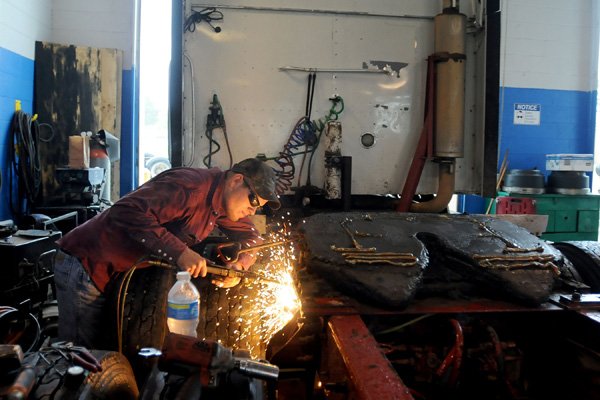SPRINGDALE — The diesel and truck technology facility at Northwest Technical Institute is a busy place. There, one will see students hard at work, applying what they’ve learned to various maintenance and repair assignments.
There’s plenty of activity — just not plenty of space.
That should change soon. A project is in the works that will double the space available to the diesel and truck program.
“It will allow us to work more efficiently,” said Kent Chambers, department chairman. “We’re so cramped for space.”
NTI is finalizing a contract with Key Architecture, a Fayetteville firm chosen to design a 6,510-square-foot addition to the program’s facility.
The first phase of the addition project will involve erecting only the shell of the building, which initially will be used as storage space. As the school secures more money, some of the room inside will be converted into classroom space.
The first phase probably will be done in about a year and cost an estimated $450,000, though it’s too early to determine an exact cost, said George Burch, NTI president.
“It will be a better facility for students to learn in and work,” Burch said. “It’s hard for them to get around in the current facility.”
There is a waiting list for the diesel and truck program, which now has 30 students enrolled. Once the addition is complete, Burch said he expects the program to be able to add 10 students.
Chambers has led the program for about eight years. Since he started, he said he has seen enrollment almost double.
At A Glance
Diesel Education
The objectives of Northwest Technical Institute’s diesel and truck technology program are:
To develop skills necessary to diagnose, repair and service heavy-duty diesel equipment and trucks.
To become adept at analyzing truck component failure, servicing the components, using testing procedures and troubleshooting.
To develop an awareness of the importance of preventive maintenance and high-quality workmanship.
To recognize the importance of the involvement in student organizations.
Source: Northwest Technical Institute
Travis Steelman, 31, of Tontitown is set to graduate from NTI’s diesel truck program in December. He has worked as a truck driver and is now self-employed in diesel repair.
“I’ve always been mechanical and enjoyed working on stuff, but as I got older I realized I needed more education,” Steelman said. “Coming here was the best thing I ever did.”
Jesse Donohew, 20, of Springdale, also is enrolled in the program. He wanted to learn more about diesel technology and was encouraged by the experience some of his friends had with the NTI program. Now he says he would like to land a job with a large company such as Peterbilt or Caterpillar.
There is a high demand for certified technicians in the diesel and truck industry. The knowledge and skills necessary for these jobs is more complex than what is required in the general automotive service industry. The U.S. Department of Labor reports the median annual wage of diesel technicians and mechanics was $40,850 in 2010.
Nearly all graduates of NTI’s diesel truck program find jobs locally, Chambers said.
“The industry is growing,” Chambers said. “Most of the work force is retiring.”
Terry Graves, service manager at Lift Truck Service Center in Springdale, said that since about 2005, diesel technicians have been getting increasingly difficult to find.
“The newer generation of people coming up don’t want to get dirty,” Graves said. “It’s a dirty job being a mechanic.”
For 12 years Graves has served on the diesel and truck program’s advisory council, which periodically reviews the curriculum and recommends changes to keep course work relevant to the real world.
While working for past employers in the truck service industry, Graves said he typically would hire interns and full-time employees who came out of NTI.
“I’m a real supporter of it,” he said.

